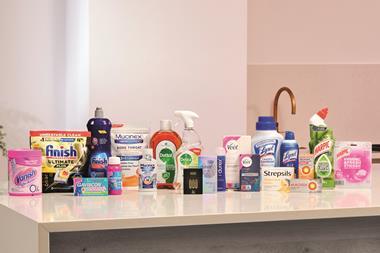The Food Standards Agency is putting an "obsession with control" before nutritional improvement, suppliers told The Grocer this week after the FSA refused to reconsider the controversial 100g base of its Nutrient Profiling Model.
Healthy products such as cheese, Marmite and honey will continue to fall foul of advertising restrictions after a review panel found the model "scientifically robust and fit for purpose".
The only concession to change was the removal of the protein cap, which will class a small number of products, mostly adult-oriented snacks and cereals, as low in fat, salt and sugar.
"The argument that portion sizes need to be fixed for the model to work is fallacious, based upon an obsession with control rather than nutritional improvement, " said Dr Gary Stephenson, principal nutritionist for Procter & Gamble UK & Ireland. "If the model was based on portion size it would be far more relevant, introducing so much more flexibility into the system and encouraging nutritional improvement in product development.
"The model has exactly the same problems as before of being unscientific and disproportionate, with unpredictable and uncertain consequences."
Dairy producers in particular had hoped the FSA would heed the concerns raised by The Grocer's Weigh It Up! campaign and reassess the base of the model to reflect more realistic portion sizes. "We will continue to try to convince the FSA that a model based on a 100g portion size is inappropriate, said Jim Begg of Dairy UK. "At a time when a growing number of children are being diagnosed with bone health problems, and young girls particularly are found to be getting insufficient calcium in their diet, the NPM actually mitigates key sources of calcium, such as cheese."
The Food and Drink Federation, while acknowledging that the removal of the protein cap was a "sensible step in the right direction", said the changes did not go far enough.
"Significant numbers of otherwise healthy products will still fail the model," said FDF director general Melanie Leech.
A host of manufacturers, including Nestlé, Kellogg's and P&G had called on the FSA to adopt a per-serving approach . "Breakfast cereals should be treated as served, i.e. with milk, and not in 100g portions," said a spokesman for Nestlé Cereal Partners.
Kellogg's said it was disappointed the model did not make allowances for dehydrated products but said the removal of the protein cap offered some possibility of reformulation.
Foods that will be reclassified as healthy include Kettle Lightly Salted Crisps, Nestlé Shreddies and chicken satay.
The FSA defended its review of the model, claiming nutrient profiling was improving the health and dietary habits of children.
"The model is innovative, fit for purpose and has a real public health benefit," said chair of the review panel, Professor Mike Kelly.
Stakeholders have the chance to comment on the Review Panel's findings over the next 12 weeks after which the panel will put its final recommendations to the FSA board. A conclusive decision on the NPM is due in early 2009.
Healthy products such as cheese, Marmite and honey will continue to fall foul of advertising restrictions after a review panel found the model "scientifically robust and fit for purpose".
The only concession to change was the removal of the protein cap, which will class a small number of products, mostly adult-oriented snacks and cereals, as low in fat, salt and sugar.
"The argument that portion sizes need to be fixed for the model to work is fallacious, based upon an obsession with control rather than nutritional improvement, " said Dr Gary Stephenson, principal nutritionist for Procter & Gamble UK & Ireland. "If the model was based on portion size it would be far more relevant, introducing so much more flexibility into the system and encouraging nutritional improvement in product development.
"The model has exactly the same problems as before of being unscientific and disproportionate, with unpredictable and uncertain consequences."
Dairy producers in particular had hoped the FSA would heed the concerns raised by The Grocer's Weigh It Up! campaign and reassess the base of the model to reflect more realistic portion sizes. "We will continue to try to convince the FSA that a model based on a 100g portion size is inappropriate, said Jim Begg of Dairy UK. "At a time when a growing number of children are being diagnosed with bone health problems, and young girls particularly are found to be getting insufficient calcium in their diet, the NPM actually mitigates key sources of calcium, such as cheese."
The Food and Drink Federation, while acknowledging that the removal of the protein cap was a "sensible step in the right direction", said the changes did not go far enough.
"Significant numbers of otherwise healthy products will still fail the model," said FDF director general Melanie Leech.
A host of manufacturers, including Nestlé, Kellogg's and P&G had called on the FSA to adopt a per-serving approach . "Breakfast cereals should be treated as served, i.e. with milk, and not in 100g portions," said a spokesman for Nestlé Cereal Partners.
Kellogg's said it was disappointed the model did not make allowances for dehydrated products but said the removal of the protein cap offered some possibility of reformulation.
Foods that will be reclassified as healthy include Kettle Lightly Salted Crisps, Nestlé Shreddies and chicken satay.
The FSA defended its review of the model, claiming nutrient profiling was improving the health and dietary habits of children.
"The model is innovative, fit for purpose and has a real public health benefit," said chair of the review panel, Professor Mike Kelly.
Stakeholders have the chance to comment on the Review Panel's findings over the next 12 weeks after which the panel will put its final recommendations to the FSA board. A conclusive decision on the NPM is due in early 2009.













No comments yet